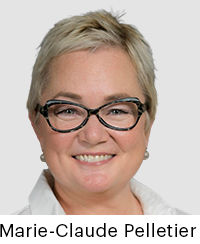
Global-Watch Network is an international collaborative platform on workplace health and wellness that informs its members of best practices worldwide and offers them tools. In a webinar held in May 2022, the company addressed several issues and trends observed in Canada and around the world.
Marie-Claude Pelletier, President and founder of Global-Watch, discussed some of these issues with Insurance Portal. First, she says, we are living through two pandemics: The coronavirus and mental health issues in the workplace. Pandemic fatigue is affecting all employees, especially women, millennials and managers.
Managers’ overall health
Manager’s overall health has recently become a concern, and their psychological distress has become very worrisome, Pelletier continues. “Particularly since last fall, we have seen employers express concern about their managers’ mental health.”
In her webinar presentation, Pelletier points out that managers and business leaders are stuck in a “sandwich” role. As the Global-Watch president explained to Insurance Portal, managers often grapple with paradoxical demands: Stimulating growth and teams in an unstable environment of labor shortages and work chain disruptions, while keeping an eye on their employees’ mental health.
“The pandemic has been extremely demanding for managers over the past two years, and now they deserve particular attention,” Pelletier adds. “When we talk about health at the workplace, we often focus on employees, but we forget about managers. It’s their turn.”
She notes that new practices are being rolled out in companies such as naming the concern, assessing the risks that managers face and implementing dedicated solutions.
Shecession and compassion fatigue
Shecession is more than just a buzzword, Pelletier says. It is popping up everywhere, she points out, adding that women's presence in the workplace has sustained a major setback due to the pandemic and family-work balance. She expects this situation to last some time.
During the pandemic, women shouldered a heavier mental and emotional burden than men, Global-Watch observes. “Women’s work was interrupted more than men’s during the pandemic, because women acted as caregivers or looked after children at home. They often took on many more domestic tasks than men did. Work interruptions are very demanding psychologically,” she explains. Pelletier labels this phenomenon compassion fatigue, adding that it also affected managers as whole.
Companies seem to be responding to the shecession, she continues “We've fallen so far behind that more and more initiatives are being launched in companies. When an employer takes action to address the challenges women face in the workplace, it often integrates a broader diversity, equity and inclusion strategy into its mental health and wellness programs,” adds Pelletier.
These strategies encompass not only the status of women, but also that of all individuals with a minority religion or sexual orientation.
Millennials in search of meaning
Millennials’ health situation is “really concerning,” Pelletier says. “They have less experience in the workforce and may have fewer tools to deal with the challenges of the workplace.”
She adds that millennials are looking for meaning in their work. Labour instability is one manifestation of this trend, says the president of Global-Watch, who has experienced this situation herself as an entrepreneur. “We have an open position and this is the fourth time we've gone through the hiring process. I'm not the only one. You see it everywhere,” she says.
More and more employee retention strategies are emerging as people leave their jobs, Pelletier continues. “The pandemic has allowed us to take a step back. Are we where we want to be? Is this what we want to do in life?”
Global-Watch's recommendations during the webinar include creating open spaces for dialogue between employees and managers to help resolve mental health issues. The network also advises companies to expand and evolve support programs, which help attract and retain employees.
Pandemic fatigue: From sprint to marathon
Pelletier says that because of the pandemic, everyone now has a better grasp of the concept of mental health. The World Health Organization (WHO) defines mental health as a state of complete physical, mental and social well-being and not merely the absence of disease or infirmity. Health is thus considered in its entirety. It is an integral component of health and well-being, the WHO adds.
The physical, mental and social pillars are fundamental; companies must now rebuild, maintain and nurture them in the daily work environment. Sustainable performance hangs in the balance, Pelletier believes.
The pandemic has exacerbated problems that we were partly aware of, Pelletier continues. “We contended with digital fatigue and these days we're experiencing pandemic fatigue. We had to draw heavily on our resources to constantly adapt: We did a sprint that turned into a marathon followed by another one, without taking a break.”
Pandemic fatigue can increase anxiety, depression, suicidal thoughts and sleep disturbances, Global-Watch estimates
Psychosocial risks: A legal requirement
Pelletier points at that Quebec’s Act to modernize the occupational health and safety regime (Bill 59, 2021, chapter 27) requires employers to assess psychosocial risks as of April 6, 2022.
“The law recognizes psychological illnesses in the portfolio of causes of health problems that are insurable,” she says. The Commission des normes de l'équité, de la santé et de la sécurité du travail (CNESST) is a game changer, Pelletier says. “So employers need to be able to measure the issues related to mental health and the ability to perform, for employees and managers alike.”
Pelletier invites companies to develop a dashboard of indicators to help them comply with the law. “Including mental health in risk management is very important,” she adds.
Measuring the risks
She believes this shift will take place over a three-year period. “It's not something that can be done overnight,” says Pelletier. “There are common core indicators, such as absenteeism and turnover rates, but we have identified 95 indicators in the literature.”
She says she reaches nearly one million employees in about 50 countries through her employer members. “Every week we receive and analyze 2,000 to 3,000 news items in the mental health and wellness field from around the world.”
Looking at too many indicators is another pitfall, Pelletier adds. “You don't track them well and you put too much administrative burden on things that you won't use optimally,” she explains. “It's like an a la carte menu: you're not going to eat everything; you have to prioritize and choose based on criteria and steps. There's a process to follow. You can't just copy and paste another company's dashboard.”
Companies that prioritize mental health will need to measure the problem and track its progress. She says that she is receiving more requests than ever for indicators used to measure managers’ mental health.
She encourages companies that survey their employees’ mental health status to do the same for managers. “Managers are claiming that they can't take it anymore. We need to put numbers, indicators on this!”
Human indicators
Non-financial performance indicators are trending, Pelletier adds. “This is what I call the double bottom line. Rather than providing information on the company's profits or losses, this line tells the company how the health of its staff is going, of the people who generate the financial performance. It's important to have a dashboard that allows us to track what's cooking.”
Pelletier sees the use of indicators as pivotal to sustainable growth. She points out that standards in this area are being developed on the international scene, giving the example of the ISO 45003 standard on psychosocial health and safety at work. This standard, published in 2021, has been expanded to address prevention.
Imagining how to nourish health
Pelletier invited the President and CEO of the Business Development Bank of Canada (BDC), Isabelle Hudon, to deliver the opening remarks of her webinar. “We are living at a particularly anxiety-inducing time in our history,” Hudon said.
Hudon mentions the horrors in Ukraine, the pandemic that lengthens and intensifies isolation and the difficulties of work-life balance. “Our health is collectively weakened by all these successive waves, the recent events in Ottawa and elsewhere in the country,” she said.
Hudon believes that companies need to think about how to manage these anxieties, which are affecting “our employees, our colleagues.” She adds that employee mental health is now a risk factor for businesses. “We need to take action on mental health and prevent mental illness. It is time to step out of your comfort zone and think of initiatives that will nurture health, not only physical, but also mental, especially because employee retention is currently a major challenge,” Hudon says.




